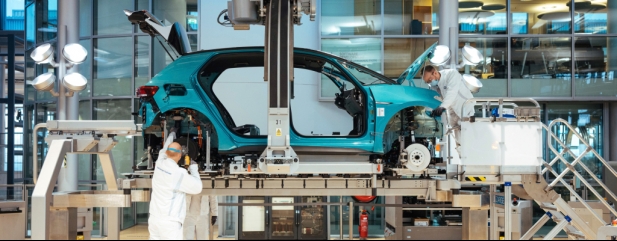Archived article
Please note that tax, investment, pension and ISA rules can change and the information and any views contained in this article may now be inaccurate.
VW charges up for electric vehicle push

In August 2020 we flagged German auto maker Volkswagen as a value play at €139, since when the stock has gained more than 40%.
Its shares have been particularly strong this year as the firm rolls out its electric vehicle strategy, culminating in this week’s ‘Power Day’.
In contrast, electric vehicle specialist Tesla has had a torrid time this year with shares tumbling from $900 in January to a 2021 low of $563.

VW has grand plans for a big electric vehicle push. As well as reducing the cost of ownership in the space it is investing heavily in new battery technology to improve range and in new charging networks to improve ease of use.
The company aims to reduce battery prices to below €100 per kilowatt hour through a combination of advanced cell design and lower manufacturing costs, all while using green energy.
Beginning with a €14 billion investment in Sweden with partner Northvolt, VW aims to have six gigafactories in Europe by 2030 with a combined capacity of 240 gigawatt hour.
More significantly, VW has partnered with BP (BP.), Spanish utility Iberdrola – a world leader in green energy – and Italian utility ENEL to install 18,000 new high-power charging stations across Europe.
The current lack of infrastructure is seen as a key reason for the slow mass adoption of electric vehicles. By working jointly to create a network of renewable-powered rapid-charging stations, each company gets closer to its net-zero goals to boot.
However, VW has even grander plans. All of its electric vehicles come with a home-charging station called Elli. When parked and connected to the Elli Cloud, a VW ID.3 becomes a ‘mobile power bank’ capable of feeding power back to the house for up to five days.
Using intelligent management systems, energy could be transferred to the vehicle during off-peak hours and transferred back to house when needed.
Not only would this save wasting renewable electricity – last year Germany wasted 6,000 gigawatt hours of renewable energy due to lack of storage – when rolled out to commercial and industrial customers it could drastically reduce the cost of expanding transmission networks.
Important information:
These articles are provided by Shares magazine which is published by AJ Bell Media, a part of AJ Bell. Shares is not written by AJ Bell.
Shares is provided for your general information and use and is not a personal recommendation to invest. It is not intended to be relied upon by you in making or not making any investment decisions. The investments referred to in these articles will not be suitable for all investors. If in doubt please seek appropriate independent financial advice.
Investors acting on the information in these articles do so at their own risk and AJ Bell Media and its staff do not accept liability for losses suffered by investors as a result of their investment decisions.
Issue contents
Exchange-Traded Funds
Feature
- Now is a good time to take a stake in Tesla
- Hacking attacks could see surge in cyber insurance claims
- Trying to double your money using a £50,000 inheritance
- Vodafone-backed Vantage Towers: it’s all about the income
- Three IPOs to buy and the names coming soon
- Why supermarkets won’t be shaking over Amazon Fresh
- How to get involved in IPOs
- 3 stocks to play the exciting hydrogen theme
 magazine
magazine








